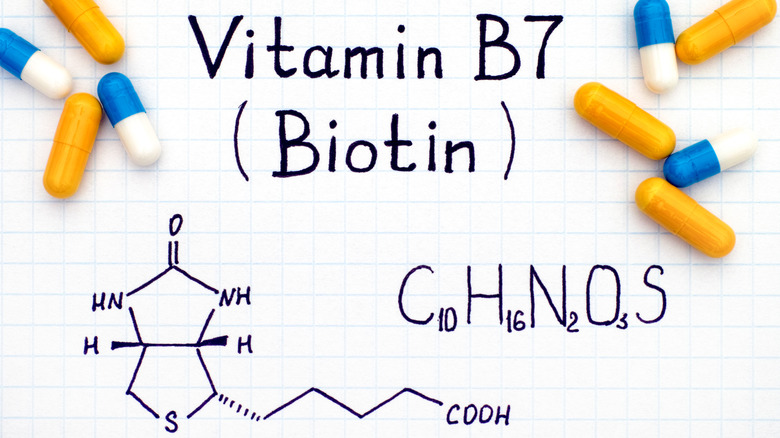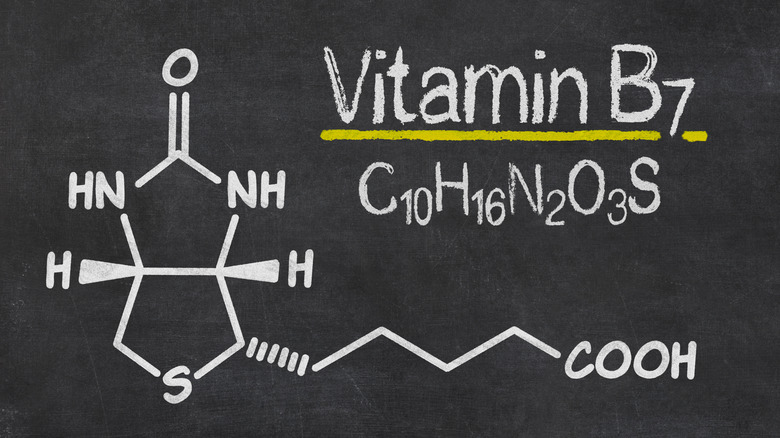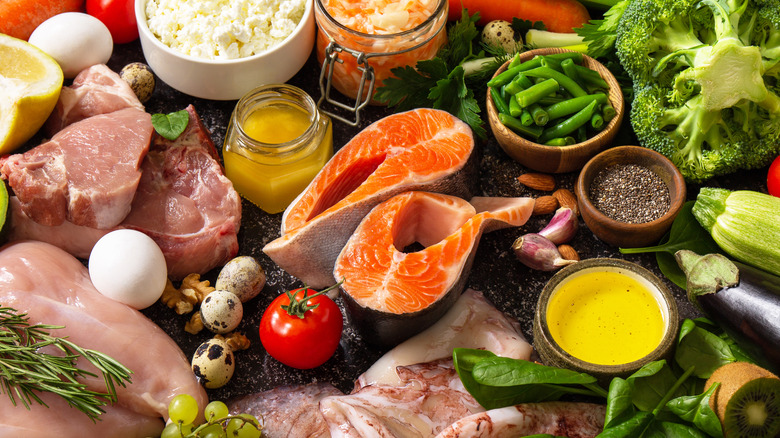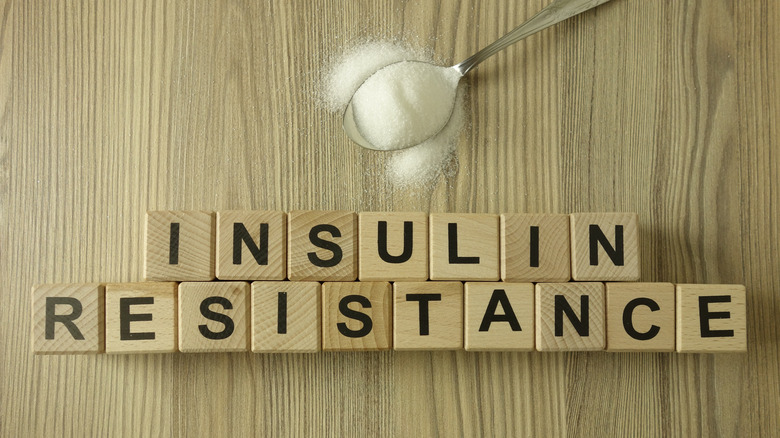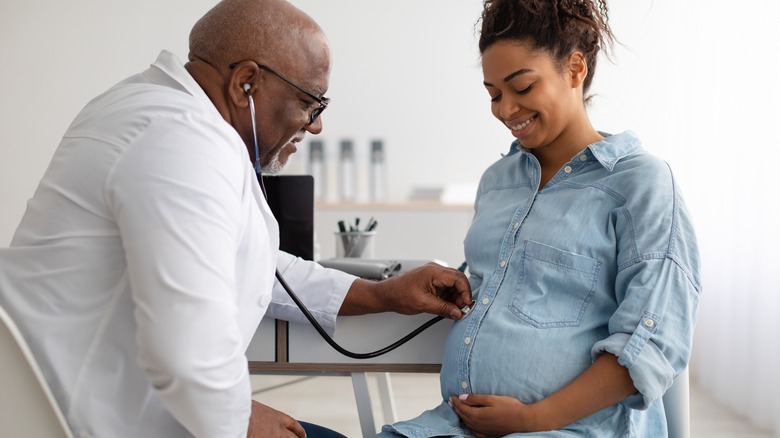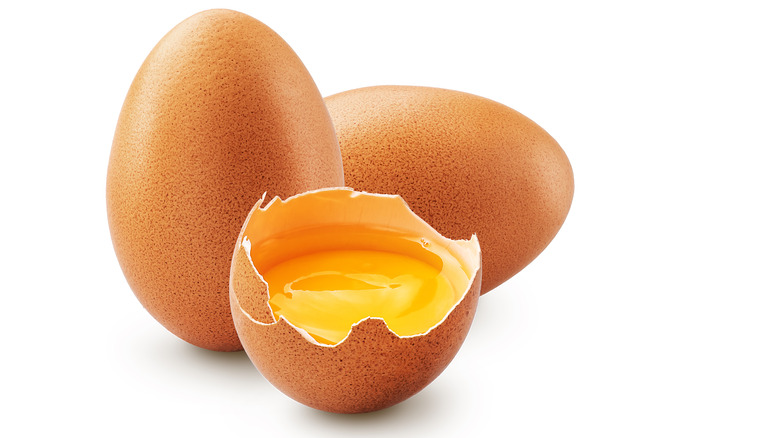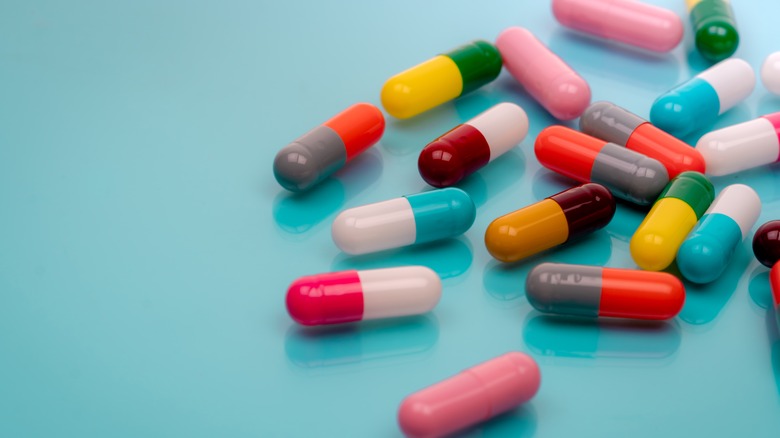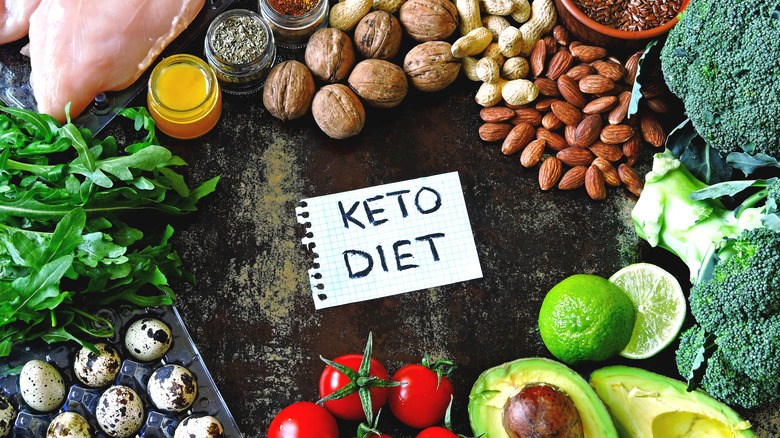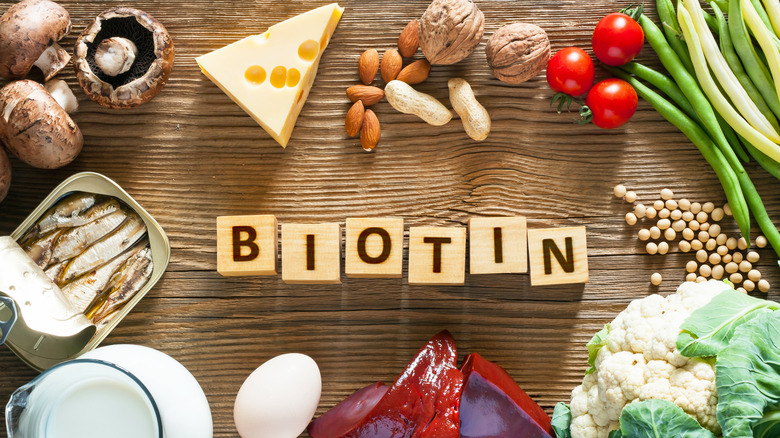Everything You Wanted To Know About Biotin
Many people are familiar with biotin because of its role in hair and nail health, and many cosmetic products boast containing this vitamin (via Mount Sinai). But biotin, also known as Vitamin H or Vitamin B7, has many functions beyond that, and the evidence for promoting hair and nail growth is actually surprisingly sparse.
Scientifically speaking, biotin is a vitamin, a necessary cofactor that must be obtained through diet because it cannot be synthesized by the body naturally, per Britannica.com. It falls in the B-vitamin family, along with the other B-vitamins like B6 and B12, and plays a similar role as the other B-vitamins, helping to convert food into energy (via the National Institutes of Health). The word "biotin" is Greek in origin and comes from the root word "biotos," meaning "life-giving," per WebMD. Biotin indeed helps to maintain many of the body functions necessary for life. Like other B-vitamins, it serves as a cofactor or helper for enzymes. Enzymes are proteins that speed up chemical reactions. Without them, many of the chemical reactions in our body that help sustain life would simply not happen quickly enough. Biotin in particular serves as a cofactor for several carboxylase enzymes. Carboxylase enzymes are any enzymes that assist the addition of a carboxyl group to a molecule and are involved in many metabolic reactions in the body, per Biotin.
In this article, we will cover some of the lesser-known roles of biotin as well as some surprising health conditions it may benefit. We will also highlight signs of biotin deficiency, excess, and food sources of this important nutrient, plus address the veracity of those rumors that biotin is a nail and hair growth "miracle."
Signs of Biotin deficiency, excess, and recommended amounts
Although very rare in the U.S., some signs of biotin deficiency include hair loss and hair thinning, brittle nails, rash on the face –especially in the mouth and nose area, high blood acidity, seizures, and neurological disorders, according to the National Institutes of Health (NIH).
Because biotin is a water-soluble vitamin and capable of leaving the body easily through sweat and urine, toxic buildup is unlikely, but high doses commonly found in supplements may alter lab values of certain hormones such as those produced by the thyroid gland (per NIH). When biotin excess rarely does occur, it can present as increased thirst, excessive urination, and insomnia, all symptoms of hyperglycemia — which makes sense because biotin plays a role in the blood sugar response after eating, according to Biotin.
Currently, there is no RDA (Recommended Dietary Allowance) established for biotin since a deficiency is so rare, but there is an Adequate Intake (AI) which is assumed to cover nutritional needs and prevent deficiency, according to Harvard T.H. Chan School of Public Health. For men and women ages 19 and above as well as pregnant women, at least 30 micrograms is advised per day. This amount is increased to 35 micrograms per day for lactating women.
Biotin helps to make and break down carbs, proteins, and fats
Did you know that biotin plays a role in both the breakdown and storage of macronutrients (carbs, proteins, and fats)? According to Livestrong, biotin is directly involved with several enzymes that play a role in metabolism. It aids enzymes that are necessary for making fatty acid and glucose molecules and for breaking down amino acids.
So how does biotin assist fat storage, exactly? When excess calories are available, they are turned into fat through a series of steps that involve biotin as a first step. An enzyme containing biotin known as acetyl-coA carboxylase (ACC) is involved in this initial step, so when biotin levels are lower than normal there may be a reduced availability of fat storage, leaving more fat available to be burned for energy, according to a 2007 study on mice published in Proceedings of the National Academy of Sciences.
Biotin is equally important for the mobilization of energy fuels like amino acids and carbohydrates. For example, it helps enzymes involved in making glucose when your blood sugar levels fall low due to a lack of carbs in the diet, a process known as gluconeogenesis (via Oregon State University). It also helps to break down many amino acids, such as leucine.
It may help lower high cholesterol and triglycerides
There is some evidence that biotin may help people with high LDL (bad) cholesterol and triglycerides, which can be precursors to heart disease and other health problems (via Livestrong). A 2006 study out of Diabetes Technology and Therapeutics showed that when high doses of biotin were combined with a mineral chromium, patients with diabetes experienced reduced triglyceride levels. Another 2006 study from the journal Biomedicine and Pharmacotherapy showed that patients with elevated triglycerides experienced reduced triglycerides and VLDL after taking biotin. VLDL is a precursor to the more harmful LDL cholesterol, per Livestrong.
Another 2015 mouse-based study out of the Journal of Medical Food explored biotin's ability to alter lipid (fat) metabolism, resulting in reduced hyperlipidemia (too many fats in the blood). The study looked at biotin supplementation's effects on fatty tissue, as well as its effects on different signaling pathways and proteins involved in the breakdown of fats. After eight weeks of biotin supplementation in mice, there was a notable increase in two signaling pathways known as cGMP and AMPK. AMPK is a nutrient sensor that instructs the body to burn fat by making it think energy levels are low. cGMP is known for increasing the activity of brown fat tissue, which is more thermogenic (fat burning). This resulted in a reduction of baseline fatty acid levels, explaining many of the beneficial effects of biotin supplementation on high cholesterol and triglycerides.
Animal studies cannot be directly applied to humans, and more studies involving human subjects are needed with replicated results to show that biotin truly has beneficial effects on blood lipids, but these results are promising and show potential.
It may help lower blood sugar
Biotin also shows promise for people living with diabetes, particularly around high blood sugar levels and neuropathy — a painful condition caused by nerve damage that can be a complication of diabetes per WebMD. One supporting study is a mouse study out of the journal Life Sciences. The study involved twenty-six, type 2 diabetic mice with moderately high blood sugar and insulin resistance that were divided into treatment and control groups. The treatment group received biotin for ten weeks, whereas the controls only received a salt water solution. Compared to the control group, the mice treated with biotin experienced a reduced postprandial (after eating) glucose response as well as improvements in overall glucose tolerance and insulin resistance.
Even more promising, a 2008 human study in Diabetes/Metabolism Research and Reviews looked at chromium and biotin together to assess their effects on participants with diabetes, since both nutrients play a role in carbohydrate metabolism. Four hundred plus participants with poorly managed type 2 diabetes and high HbA(1c) levels (a long-term measure of blood sugar) were enrolled. They were divided into groups that received one of two treatments: chromium and biotin or a placebo for three months, alongside oral anti-diabetic drugs. After 90 days, the treatment group who received biotin and chromium in addition to the antidiabetic drugs experienced a significant drop in HbA(1c) and fasting blood sugar compared to the placebo group, leading the study to conclude that biotin-chromium combination therapy in addition to anti-diabetic agents may improve glycemic control better than antidiabetic agents alone.
It's vital for a healthy pregnancy
There is perhaps no other time in life when nutrition is more top of mind than during pregnancy. With a rapidly growing baby, proper nutrition is essential to ensure both the health of mom and baby (via Healthline). The role of biotin in fetal development is particularly important according to much research. One 2020 study out of The Journal of Medical Investigation discussed how low biotin levels in pregnancy is tied to both reduced fetal growth and premature delivery by restricting the growth of the fetus. The study looked at mothers who had given birth at full term versus preterm and assessed the biotin levels in their blood. It found that mothers who delivered small-for-gestational-age babies, a sign of restricted fetal growth, had significantly lower biotin levels in their second and third trimester blood samples compared to mothers who delivered average-sized babies.
Indeed, Healthline recommends that pregnant women check if their prenatal vitamin contains adequate biotin — though it shouldn't exceed the recommended amounts, as too much may be harmful to the baby.
Furthermore, according to Biotin and Other Interferences in Immunoassays, biotin deficiency is of particular concern during pregnancy because levels are naturally reduced. In some people, levels continue to decrease throughout pregnancy, reaching marginal deficiency levels towards the end in as many as 50% of pregnant women. The text goes on to explain how many pregnant women experience a type of subclinical biotin deficiency due to the growing baby using up the mother's biotin stores. In any case, it is important to monitor biotin status at this crucial time because of possible ill health effects, such as cleft palate and other fetal malformations shown in the offspring of biotin-deficient mice.
It probably does not give you better hair, skin, and nails
Chances are you have heard that biotin can give you luminous hair, glowing skin, or longer nails, as that is commonly touted by the media and cosmetic companies (via the American Academy of Dermatology). But there is actually very little evidence for this.
So how did biotin get this reputation in the first place? Cleveland Clinic spoke with Registered Dietitian Courtney Barth, who explained that this reputation largely comes from the fact that biotin deficiency often leads to hair loss, dry, scaly skin, and weak nails that break easily. Barth states that "biotin deficiency is rare in the U.S. So if you have thinning hair or brittle nails, it's probably not due to a biotin deficiency. There's usually another health condition causing these problems, such as iron deficiency or a thyroid issue." She goes on to advise that people to pay a visit to their healthcare provider for hair, skin, or nail problems rather than stocking up on biotin supplements, which are unlikely to help if a deficiency isn't present.
Barth does say that although "No studies have proven that biotin supplements will change the appearance of your hair, skin or nails," biotin supplementation is unlikely to cause harm if you notice a positive difference. But most of the support for biotin for healthy skin, hair, and nails is purely anecdotal and not evidence-based. For general skin, hair, and nail health, a balanced diet with plenty of fruits and vegetables, protein, and adequate hydration is recommended.
Raw eggs reduce biotin absorption
Now this is ironic: A rich food source of biotin, eggs, can actually inhibit biotin absorption and may even lead to deficiency if eaten raw, according to Harvard T.H. Chan School of Public Health. This is due to a protein called avidin present in raw eggs that binds to biotin and prevents its absorption. Even if you don't chug raw eggs in the morning, you may still have a problem if you frequently use mayonnaise, Caesar dressing, or eggnog prepared with raw eggs — something to consider when licking that bowl of cookie dough. Cooked eggs are a non-issue because heating the eggs breaks down this protein, according to Biotin and Other Interferences in Immunoassays, such that it's no longer able to bind to the biotin. Raw eggs can also harbor harmful bacteria that can make you sick like salmonella (via the Centers for Disease Control and Prevention). The lesson is simple: Limit your raw egg consumption.
Certain drugs may increase your biotin needs
Certain medications and classes of drugs can also make someone more prone to a biotin deficiency, one of them being antiseizure drugs, according to Oregon State University. This is because anticonvulsant drugs can inhibit intestinal absorption of biotin and the kidney's ability to reabsorb biotin, as well as increase its general breakdown in the body. So if you are on antiseizure drugs, it may not hurt to have your biotin levels checked by your doctor every now and then.
Alcohol, although not a prescription drug, is a drug that may also impair biotin absorption. This is particularly true in the case of chronic alcohol abuse where malnutrition and biotin deficiency become more likely, according to a 2010 study out of American Journal of Physiology Gastrointestinal and Liver Physiology that assessed the mechanism by which alcohol reduces biotin absorption in rats. Researchers state that "Chronic alcohol use in humans is associated with a significant reduction in plasma biotin levels, and animal studies have shown inhibition in intestinal biotin absorption by chronic alcohol feeding." The study revealed that rats overfed alcohol experienced reduced activity of a protein called SMVT that is critical for biotin absorption.
Ketogenic diets may cause biotin deficiency
Although biotin deficiency is rare in the U.S. (per Biotin), certain diets are linked to low biotin status, one of them being ketogenic or "keto" diets, according to Healthline. Keto diets are sometimes linked to hair loss, which is also a hallmark of biotin deficiency. Part of the hair loss seen in someone following a ketogenic diet is caused by loss of nutrients and the body's response to reduced calorie consumption over a long period of time.
But there is also evidence directly linking the keto diet to biotin deficiency from a 2013 animal study out of the journal Nutrition. The study showed that mice following both a biotin-deficient ketogenic diet and a biotin-deficient control diet experienced biotin deficiency symptoms like dermatitis and hair loss after nine weeks. Their low biotin status was verified with biotin tissue and enzyme tests. The biotin-deficient ketogenic diet group showed more extreme signs of biotin deficiency than the biotin deficient control group that did not follow a ketogenic diet.
It is thought that this is due to the effects of ketosis in the body. The body makes more sugar and breaks down more proteins during ketosis, a process that requires generous biotin, leading to deficiency. The study concluded that people following ketogenic diets require more biotin to prevent deficiency.
Biotin food sources
Fortunately, getting enough biotin in your diet is not difficult, as the nutrient is abundant in a plethora of food groups. Healthline notes egg yolks as an excellent source of biotin. Eggs are a rich source of many B-vitamins, including biotin, which is concentrated in the yolks. One cooked egg contains approximately 10 mcg of biotin, which is one third of the average person's needs for the day, so two scrambled eggs in the morning and you're already two-thirds of the way there!
Plenty of plant foods are also rich in biotin including nuts, seeds, legumes, beans, and peas. An ounce of peanuts has 5 mcg of biotin, or 17% of your daily needs. Soybeans are especially rich in biotin, containing almost 20 mcg per ¾-cup serving.
Organ meats are another rich source of biotin. Cooked beef liver, for instance, has a whopping 138 mcg for a 3-ounce serving, which is over four hundred percent of the DV. And if you're a fan of nutritional yeast, you also enjoy a high intake, as just 2 tablespoons contains 21 mcg of biotin, about 70% the DV. All in all, a balanced diet rich in fruits, veggies, nuts, seeds, and legumes is likely to supply enough biotin.

